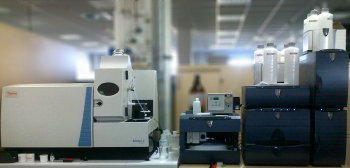Thermo Fisher Scientific Inc., the world leader in serving science, today announced that its Dionex ICS-5000 reagent-free ion chromatography system can be coupled with the Thermo Scientific XSERIES 2 ICP-Q-MS to create a proven IC-ICP-MS method for detecting trace elements, including levels of organic and inorganic arsenic in apple juice.
A Consumer Reports investigation recently revealed elevated levels of arsenic in juice samples.

Thermo Fisher's highly sensitive and selective equipment can distinguish between both inorganic and organic types of arsenic. The distinction is important, as inorganic forms of arsenic are highly toxic whereas organic forms are not. Arsenic is a naturally-occurring element that is sometimes found in drinking water and fruit juices, entering during agricultural and industrial processes. Because typical levels of total arsenic found in apple juice are lower than the U.S. Environmental Protection Agency (EPA) drinking water maximum contaminant level, apple juice is generally considered safe and is currently not regulated.
"Thermo Fisher has developed a highly sensitive and specific method for analyzing arsenic levels in apple juice," said John W. Plohetski, vice president and general manager, ion chromatography/sample preparation business unit at Thermo Fisher. "The ability to distinguish between organic and inorganic forms of arsenic is critical, and our equipment is sensitive enough to capture that data accurately and reliably."
为了证明狄奥克斯ICS-5000和Thermo Scientific XSeries 2的合并功能,Thermo Fisher测试了从当地超市购买的四个苹果果汁品牌。研究人员使用Dionex IC系统进行色谱分离和XSeries 2质谱仪,开发了一种高度敏感的常规IC-ICP-MS方法,用于确定痕量金属物种,包括砷。该方法可以在简单的10倍稀释后分析不同的果汁。